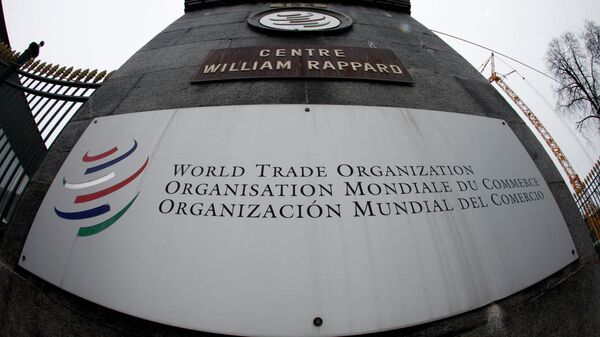Speaking at a WTO Council of Goods meeting in Geneva, fifteen countries, including the US, India and New Zealand, have voiced concerns about Brexit potentially damaging their economies.
Tariff Rate Quotas: Burning Issue Amid Post-Brexit Trade Limbo
The main talking point is a system that facilitates their easier access to the EU's large market for limited quantities of some of their goods, mainly farm products - so-called "tariff rate quotas”. Under the WTO’s rules, TRQs are used to set a threshold at which foreign goods can be imported at discounted tariff rates.
While the current quotas are for the whole of the EU, including the UK, Brexit means the UK and the EU have to decide how to justly distribute them.
Non-European countries like Australia and the US chimed in saying Brexit would disrupt the reduced tariffs system, meaning their producers could lose access to both the British and EU market.
“We will be quickly crowded out and face a loss of access to both markets”, the US said in a statement delivered to the WTO meeting.
One of the concerns raised is that the UK and EU might themselves end up using part or even all of the quotas, with the US stating it could cripple its sales of pork and wine.
New Zealand, for its part, agreed that it was “hard to see" how WTO members from outside Europe “would have much realistic chance of accessing the quotas”.
The country went on to call on London and Brussels to set quotas “explicitly preserved for other WTO members to maintain our existing levels of access, or substantially expanded (quotas) to account for the large bilateral EU-UK trade”.
In the meantime, Brazil called attention to the Brexit plans for customs procedures between Northern Ireland and Great Britain, arguing it would violate the WTO’s paramount principle of non-discrimination.
Already Suffering
Addressing the general uncertainty following several Brexit delays, Australia said the country’s beef and lamb exporters had already suffered a blow following several Brexit extensions. A paper prepared for the meeting said that when Brexit was still scheduled for 31 October, many Australian businesses ceased exports of valuable beef and sheep meat ahead of Christmas because of uncertainty about whether they would be able to make use of these quotas.
Compensations Needed
A number of states present at the gathering demanded compensation from the UK and EU, in the event of an unfair distribution of TRQs. In the WTO such compensation usually means reducing tariffs on a number of other goods.
The current Brexit deadline is 31 January 2020. Prior to that, the UK is scheduled to hold a snap vote on 12 December agreed upon by Parliament following Boris Johnson’s three other attempts to barrel through the national vote proposal, as well as the Brexit deal negotiated with the EU. Johnson has vowed the deal will be ratified shortly after the elections so that the UK might depart from the UK ahead of schedule.
"There is a tension between increased challenges like Brexit on the WTO and the limited capacity of the WTO to respond to new issues (e.g., 164 WTO members, the requirement of consensus to reach an agreement)," said Heng Wang, associate professor and co-director of Herbert Smith Freehills China International Business and Economic Law Centre at the University of New South Wales, Sydney.
The academic noted that given the uncertainties in the world trading system, "more efforts are needed to strengthen the multilateral trading system, " and if properly managed, it will "maintain a rule-based system and bring more predictability for the world."
Heng went on to assume that ways to strengthen the WTO ties and system at large include "supporting the WTO Appellate Body member (re)appointment, and negotiating a mutually acceptable solutions to the challenges arising from Brexit."




